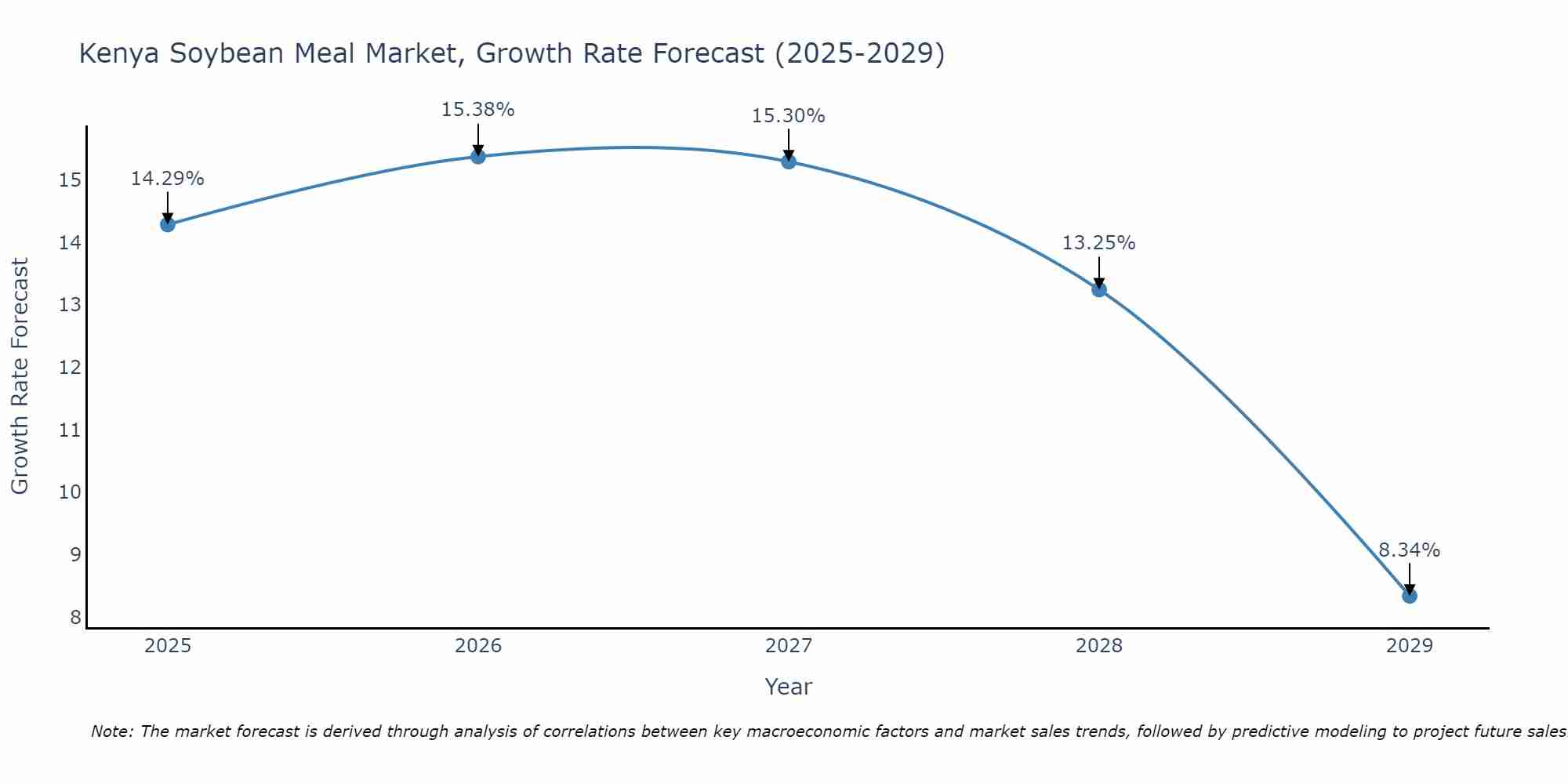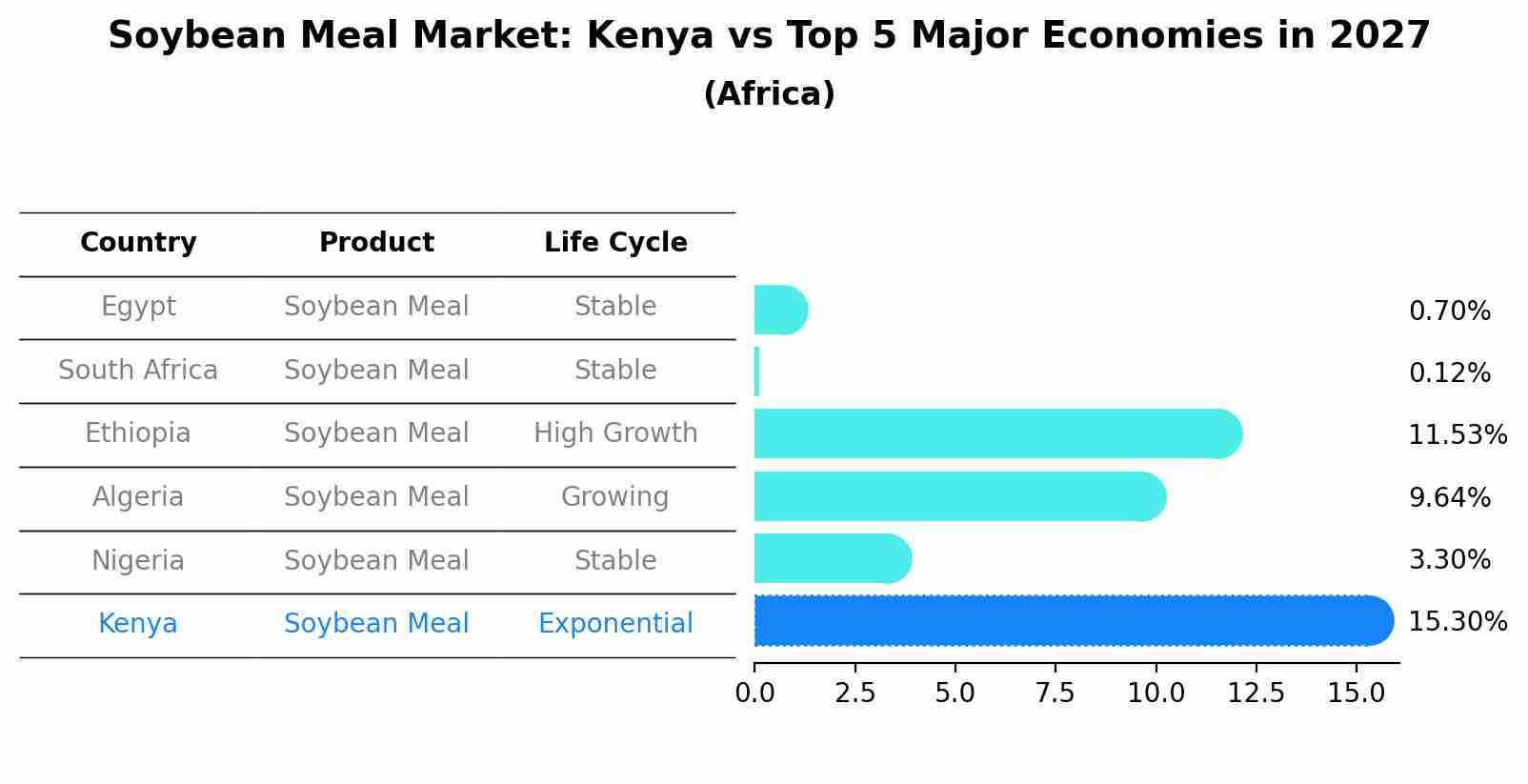Kenya Soybean Meal Market Outlook | Revenue, Analysis, Companies, Growth, Trends, Size, Share, Value, Industry, Forecast & COVID-19 IMPACT
| Product Code: ETC385010 | Publication Date: Aug 2022 | Updated Date: Jul 2025 | Product Type: Market Research Report | |
| Publisher: 6Wresearch | Author: Sachin Kumar Rai | No. of Pages: 75 | No. of Figures: 35 | No. of Tables: 20 |
Kenya Soybean Meal Market Size Growth Rate
The Kenya Soybean Meal Market is projected to witness mixed growth rate patterns during 2025 to 2029. Growth accelerates to 15.38% in 2026, following an initial rate of 14.29%, before easing to 8.34% at the end of the period.

Soybean Meal Market: Kenya vs Top 5 Major Economies in 2027 (Africa)
In the Africa region, the Soybean Meal market in Kenya is projected to expand at a exponential growth rate of 15.30% by 2027. The largest economy is Egypt, followed by South Africa, Ethiopia, Algeria and Nigeria.

Kenya Soybean Meal Market Synopsis
The Kenya soybean meal market is witnessing steady growth driven by the increasing demand for protein-rich animal feed in the country. Soybean meal is a key ingredient in livestock and poultry feed formulations, and its high protein content makes it a preferred choice for feed manufacturers. The market is also benefiting from the growing awareness among farmers about the nutritional benefits of soybean meal for livestock production. Key players in the market include feed manufacturers, agricultural cooperatives, and soybean processors who are investing in expanding their production capacities to meet the rising demand. Additionally, government initiatives to promote soybean cultivation and processing are further supporting the growth of the market. Overall, the Kenya soybean meal market is poised for continued expansion in the coming years.
Kenya Soybean Meal Market Trends
The Kenya soybean meal market is experiencing growth due to increasing demand from the animal feed industry. The rising awareness about the nutritional benefits of soybean meal as a protein source for livestock has led to its widespread adoption. Additionally, the government`s support for soybean production and processing through initiatives such as subsidies and training programs has further boosted the market. There is also a growing trend towards sustainable and organic soybean meal production, driven by consumers` preference for ethically sourced and environmentally friendly products. Overall, the Kenya soybean meal market is expected to continue its growth trajectory as the demand for high-quality animal feed ingredients rises in tandem with the expanding livestock industry.
Kenya Soybean Meal Market Challenges
In the Kenya Soybean Meal Market, several challenges are faced, including inconsistent supply due to weather fluctuations affecting crop yields, limited access to quality seeds and agricultural inputs for farmers, inadequate infrastructure for storage and transportation leading to post-harvest losses, and competition from cheaper imported soybean meal products. Additionally, there is a lack of awareness and technical knowledge among farmers regarding modern soybean farming practices and efficient processing techniques. These challenges hinder the growth and development of the soybean meal market in Kenya, impacting both producers and consumers in terms of productivity, profitability, and availability of high-quality soybean meal products for various industries such as animal feed and food processing. Addressing these challenges will require coordinated efforts from government agencies, agricultural extension services, and private sector stakeholders to enhance the overall value chain and market competitiveness.
Kenya Soybean Meal Market Investment Opportunities
Investment opportunities in the Kenya soybean meal market are promising due to the increasing demand for soybean meal as a key ingredient in animal feed production. With a growing livestock industry in Kenya, there is a consistent need for high-quality feed ingredients like soybean meal to meet the nutritional requirements of animals. Investing in soybean meal production facilities or trading soybean meal could be lucrative as the market continues to expand. Additionally, there is potential for vertical integration by establishing relationships with local farmers for soybean cultivation, creating a sustainable and reliable supply chain. As the awareness of the benefits of soybean meal in animal nutrition grows, there are opportunities for value addition and market penetration, making the Kenya soybean meal market an attractive investment option for those looking to capitalize on the country`s agricultural sector.
Jordan Agar Market Government Policies
The Kenyan government has implemented several policies to support and promote the soybean meal market in the country. This includes the National Soybean Development Strategy, which aims to increase soybean production through capacity building, research, and extension services. The government has also provided subsidies and incentives to farmers to encourage soybean cultivation. In addition, there are regulations in place to ensure the quality and safety of soybean meal products, such as the Kenya Bureau of Standards (KEBS) standards for soybean processing and packaging. Overall, these government policies are focused on boosting domestic production, ensuring quality standards, and promoting the growth of the soybean meal market in Kenya.
Kenya Soybean Meal Market Future Outlook
The outlook for the Kenya Soybean Meal Market appears promising due to increasing awareness of the health benefits associated with soy-based products and the growing demand for alternative protein sources. Factors such as a rising population, changing dietary preferences, and a shift towards healthier eating habits are likely to drive the market`s growth. Additionally, the government`s support for soybean cultivation through various initiatives and programs aimed at enhancing agricultural productivity could further boost the market. However, challenges such as limited processing capacity and fluctuating market prices may pose some obstacles. Overall, with the right strategic investments and collaborations within the value chain, the Kenya Soybean Meal Market is anticipated to experience steady growth in the coming years.
Key Highlights of the Report:
- Kenya Soybean Meal Market Outlook
- Market Size of Kenya Soybean Meal Market, 2021
- Forecast of Kenya Soybean Meal Market, 2031
- Historical Data and Forecast of Kenya Soybean Meal Revenues & Volume for the Period 2018 - 2031
- Kenya Soybean Meal Market Trend Evolution
- Kenya Soybean Meal Market Drivers and Challenges
- Kenya Soybean Meal Price Trends
- Kenya Soybean Meal Porter's Five Forces
- Kenya Soybean Meal Industry Life Cycle
- Historical Data and Forecast of Kenya Soybean Meal Market Revenues & Volume By Application for the Period 2018 - 2031
- Historical Data and Forecast of Kenya Soybean Meal Market Revenues & Volume By Animal Feed for the Period 2018 - 2031
- Historical Data and Forecast of Kenya Soybean Meal Market Revenues & Volume By Food Industry for the Period 2018 - 2031
- Historical Data and Forecast of Kenya Soybean Meal Market Revenues & Volume By Beverage for the Period 2018 - 2031
- Historical Data and Forecast of Kenya Soybean Meal Market Revenues & Volume By Healthcare Products for the Period 2018 - 2031
- Kenya Soybean Meal Import Export Trade Statistics
- Market Opportunity Assessment By Application
- Kenya Soybean Meal Top Companies Market Share
- Kenya Soybean Meal Competitive Benchmarking By Technical and Operational Parameters
- Kenya Soybean Meal Company Profiles
- Kenya Soybean Meal Key Strategic Recommendations
Frequently Asked Questions About the Market Study (FAQs):
- Single User License$ 1,995
- Department License$ 2,400
- Site License$ 3,120
- Global License$ 3,795
Search
Thought Leadership and Analyst Meet
Our Clients
Related Reports
- Canada Oil and Gas Market (2026-2032) | Share, Segmentation, Value, Industry, Trends, Forecast, Analysis, Size & Revenue, Growth, Competitive Landscape, Outlook, Companies
- Germany Breakfast Food Market (2026-2032) | Industry, Share, Growth, Size, Companies, Value, Analysis, Revenue, Trends, Forecast & Outlook
- Australia Briquette Market (2025-2031) | Growth, Size, Revenue, Forecast, Analysis, Trends, Value, Share, Industry & Companies
- Vietnam System Integrator Market (2025-2031) | Size, Companies, Analysis, Industry, Value, Forecast, Growth, Trends, Revenue & Share
- ASEAN and Thailand Brain Health Supplements Market (2025-2031) | Strategy, Consumer Insights, Analysis, Investment Trends, Opportunities, Growth, Size, Share, Industry, Revenue, Segments, Value, Segmentation, Supply, Forecast, Restraints, Outlook, Competition, Drivers, Trends, Demand, Pricing Analysis, Competitive, Strategic Insights, Companies, Challenges
- ASEAN Bearings Market (2025-2031) | Strategy, Consumer Insights, Analysis, Investment Trends, Opportunities, Growth, Size, Share, Industry, Revenue, Segments, Value, Segmentation, Supply, Forecast, Restraints, Outlook, Competition, Drivers, Trends, Demand, Pricing Analysis, Competitive, Strategic Insights, Companies, Challenges
- Europe Flooring Market (2025-2031) | Outlook, Share, Industry, Trends, Forecast, Companies, Revenue, Size, Analysis, Growth & Value
- Saudi Arabia Manlift Market (2025-2031) | Outlook, Size, Growth, Trends, Companies, Industry, Revenue, Value, Share, Forecast & Analysis
- Uganda Excavator, Crane, and Wheel Loaders Market (2025-2031) | Strategy, Consumer Insights, Analysis, Investment Trends, Opportunities, Growth, Size, Share, Industry, Revenue, Segments, Value, Segmentation, Supply, Forecast, Restraints, Outlook, Competition, Drivers, Trends, Demand, Pricing Analysis, Competitive, Strategic Insights, Companies, Challenges
- Rwanda Excavator, Crane, and Wheel Loaders Market (2025-2031) | Strategy, Consumer Insights, Analysis, Investment Trends, Opportunities, Growth, Size, Share, Industry, Revenue, Segments, Value, Segmentation, Supply, Forecast, Restraints, Outlook, Competition, Drivers, Trends, Demand, Pricing Analysis, Competitive, Strategic Insights, Companies, Challenges
Industry Events and Analyst Meet
Whitepaper
- Middle East & Africa Commercial Security Market Click here to view more.
- Middle East & Africa Fire Safety Systems & Equipment Market Click here to view more.
- GCC Drone Market Click here to view more.
- Middle East Lighting Fixture Market Click here to view more.
- GCC Physical & Perimeter Security Market Click here to view more.
6WResearch In News
- Doha a strategic location for EV manufacturing hub: IPA Qatar
- Demand for luxury TVs surging in the GCC, says Samsung
- Empowering Growth: The Thriving Journey of Bangladesh’s Cable Industry
- Demand for luxury TVs surging in the GCC, says Samsung
- Video call with a traditional healer? Once unthinkable, it’s now common in South Africa
- Intelligent Buildings To Smooth GCC’s Path To Net Zero


















